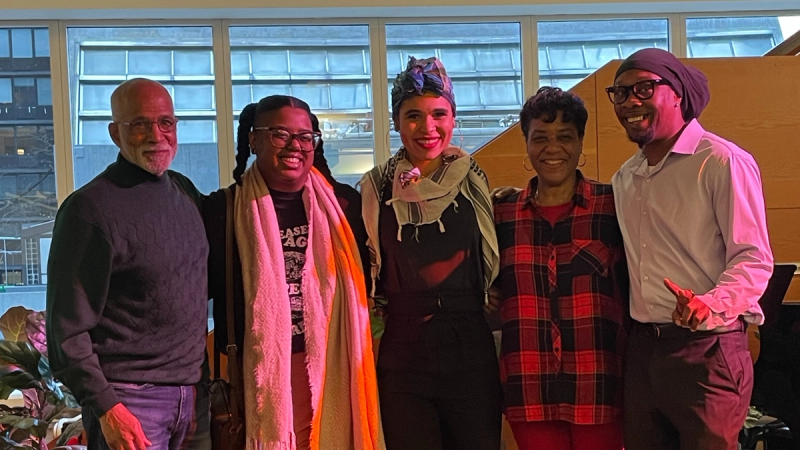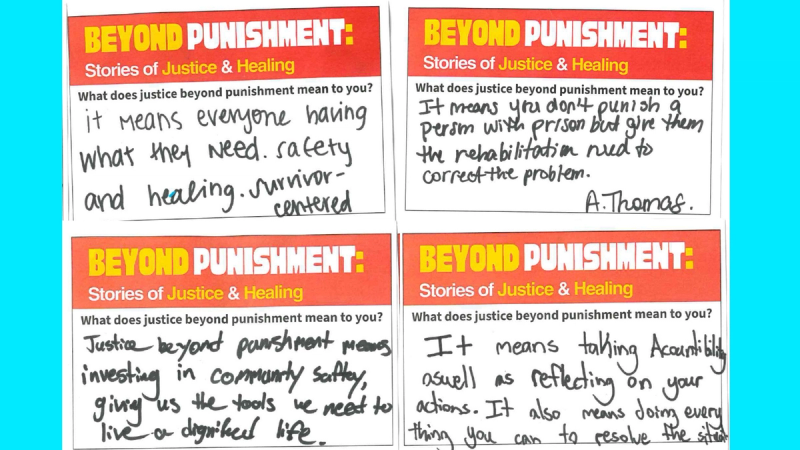Assembling cultures of care: A reflection on Beyond Punishment and Undesirable Elements

As we navigate the relentless news cycle and while capitalism seeks to desensitize us in its never-ending effort to make us exist individualistically, we continue to use the power of performing arts to ground ourselves in our humanity. PCC’s Undesirable Elements series is an ongoing community-engaged artistic practice by which we foster deeper dialogue and understanding amongst communities, through sharing both collective and individual histories. The performance becomes a collective act of empathetic listening, through which community members telling their own stories on stage invite us to become a more thoughtful and justice-oriented society as a whole.
A recent co-production, Beyond Punishment: Stories of Justice and Healing demonstrates how PCC’s community engagement practices exemplified in Undesirable Elements can be used to engage with urgent community and policy issues by serving as an incubator for community-based dialogue and action.
Beyond Punishment was initiated when writer/director Kirya was invited by the Justice Beyond Punishment Collaborative (JBPC) to create an interview-based production with justice reform organizers with lived experience of incarceration. Kirya then asked Ping Chong and Company to join as producing partner. The cast members were each individually referred and invited to participate through JPBC cohort members and the script was created through one-on-one interviews and workshops in a supportive environment. The theatrical format of Beyond Punishment is based on and inspired by the Undesirable Elements series in which Kirya has been a long-time collaborating artist and facilitator. Through experimentation with form, Kirya expanded on the linear chronological narrative of the traditional Undesirable Elements format and interwove embodied and trauma-informed practices on stage.
“The invitation to create this new work by the Justice Beyond Punishment Collaborative, and the trust of these life-long organizers have placed in me to tell their stories has reminded me that the thread between political organizing and artmaking was never broken. From my direct action beginnings to the space I now take up as a cultural worker, I have, and will always, take up the pen because my liberation depends on it. And in collaboration with others, my words can be a radical act against empire as mighty as my flesh."- Kirya Traber
PCC Associate Director Sara Zatz and Kirya Traber met weekly with the Collaborative to discuss the process of using storytelling and theater to activate around JBPC policy pillars. Together, the partners developed wrap-around audience engagement activities to accompany the production. These included tabling spaces for community organizations in the lobby of each performance and designated a quiet reflection space where audience members were invited to respond to the question, “What does justice beyond punishment mean to you?”. Each performance was followed by a talkback with JPBC Collaborative members and Kirya, reflecting on a different pillar of the collaborative’s movement work. Altogether it proved to be a transformative experience for everyone involved. And as one performer reflected, ‘....the single most restorative set of actions we can take is to document and share our stories.’

Cultivating community-rooted partnerships for the long haul
Working in partnership with community-based social justice organizations is part of how PCC's Undesirable Elements productions can serve as both an agent of community change and cultivate ongoing collaborative relationships with artists. Beyond Punishment was no exception. Kirya was first introduced to PCC through participating in the Undesirable Elements training institute, and then became an artist facilitator for the institute . Kirya's sustained engagement with PCC's core programming has led to deep creative partnerships, including the co-creation of two additional works with our Associate Director Sara Zatz for The New Victory Theater, Generation NYZ and Generation Rise.
The vulnerable stories conveyed through Beyond Punishment also required finding partner venues that could hold the depth of these stories with care and grace. Kirya's long-standing creative relationships with Black-led cultural institutions that have deep social justice legacies in New York City allowed PCC and JBPC to form new partnerships with Hi-Arts and Weeksville Heritage Center that speak to the histories presented within the show.
Through Undesirable Elements, PCC creates cultures of care within our artistic and organizational practices. Building long-term organizational and artistic partnerships allows us to cultivate the kind of relationships and belonging we want to see in our social infrastructures. As we look to the future, it is important for us to demonstrate our values around building meaningful relationships that can help forge new partnerships and alliances grounded in community-centered interventions.
For more information on partnerships and to bring Undesirable Elements to a setting near you, please email our Associate Director, Sara Zatz at sara@pingchong.org.